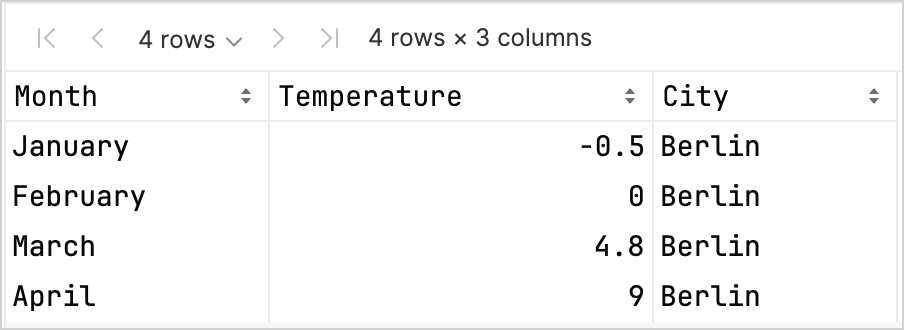在 Kotlin Notebook 中使用 Kandy 进行数据可视化
Kotlin 为强大而且灵活的数据可视化提供了一站式解决方案, 在深入研究复杂的模型之前, 提供一种直观的方式展现和浏览数据.
本教程演示如何在 IntelliJ IDEA 中使用 Kotlin Notebook 和 Kandy, Kotlin DataFrame 库创建各种图表.
开始前的准备工作
Kotlin Notebook 需要使用 Kotlin Notebook plugin, IntelliJ IDEA 默认捆绑并启用了这个插件.
如果无法使用 Kotlin Notebook 功能, 请确认启用了 plugin. 详情请参见 设置环境.
创建一个新的 Kotlin Notebook:
选择 File | New | Kotlin Notebook.
在你的 Notebook 中, 运行以下命令, 导入 Kandy 和 Kotlin DataFrame 库:
%use kandy
%use dataframe
创建 DataFrame
首先创建 DataFrame, 其中包含需要可视化的记录. 这个 DataFrame 存储 3 个城市月平均气温的模拟数字: 柏林, 马德里, 和加拉加斯.
使用 Kotlin DataFrame 库的 dataFrameOf() 函数生成 DataFrame. 请在 Kotlin Notebook 中运行下面的代码片段:
// months 变量保存一年中 12 个月份的列表
val months = listOf(
"January", "February",
"March", "April", "May",
"June", "July", "August",
"September", "October", "November",
"December"
)
// tempBerlin, tempMadrid, 和 tempCaracas 变量保存每个月的气温值的列表
val tempBerlin =
listOf(-0.5, 0.0, 4.8, 9.0, 14.3, 17.5, 19.2, 18.9, 14.5, 9.7, 4.7, 1.0)
val tempMadrid =
listOf(6.3, 7.9, 11.2, 12.9, 16.7, 21.1, 24.7, 24.2, 20.3, 15.4, 9.9, 6.6)
val tempCaracas =
listOf(27.5, 28.9, 29.6, 30.9, 31.7, 35.1, 33.8, 32.2, 31.3, 29.4, 28.9, 27.6)
// df 变量保存一个 DataFrame, 包含 3 个列, 分别是月份, 气温, 城市的记录
val df = dataFrameOf(
"Month" to months + months + months,
"Temperature" to tempBerlin + tempMadrid + tempCaracas,
"City" to List(12) { "Berlin" } + List(12) { "Madrid" } + List(12) { "Caracas" }
)
查看前 4 行, 浏览新创建的 DataFrame 的结构:
df.head(4)
你可以看到, DataFrame 有 3 个列: Month, Temperature, 和 City. DataFrame 的前 4 行包含柏林从 1 月到 4 月的温度的记录:

创建折线图(Line Chart)
下面我们在 Kotlin Notebook 中, 使用前一节中的 df DataFrame, 创建一个折线图(Line Chart).
使用 Kandy 库的 plot() 函数. 在 plot() 函数中, 指定图表类型 (这个示例中是 line), 以及用于 X 轴和 Y 轴的值. 你可以定制颜色和大小:
df.plot {
line {
// 访问 DataFrame 的列, 用于 X 轴和 Y 轴
x(Month)
y(Temperature)
// 访问 DataFrame 的列, 用于分组, 并为这些分组设置颜色
color(City) {
scale = categorical("Berlin" to Color.PURPLE, "Madrid" to Color.ORANGE, "Caracas" to Color.GREEN)
}
// 定制线条的大小
width = 1.5
}
// 定制图表布局的大小
layout.size = 1000 to 450
}
结果如下:

创建点图(Point Chart)
下面, 我们使用一个点图(Point Chart), (或者叫散点图 (Scatter Chart)) 对 df DataFrame 进行可视化.
在 plot() 函数中, 指定图表类型为 points. 从 df 的列添加 X 轴和 Y 轴的值, 以及分组值. 你也可以为图表添加标题:
df.plot {
points {
// 访问 DataFrame 的列, 用于 X 轴和 Y 轴
x(Month) { axis.name = "Month" }
y(Temperature) { axis.name = "Temperature" }
// 定制点的大小
size = 5.5
// 访问 DataFrame 的列, 用于分组, 并为这些分组设置颜色
color(City) {
scale = categorical("Berlin" to Color.LIGHT_GREEN, "Madrid" to Color.BLACK, "Caracas" to Color.YELLOW)
}
}
// 添加图表标题
layout.title = "Temperature per month"
}
结果如下:

创建柱状图(Bar Chart)
最后, 我们创建一个柱状图(Bar Chart), 按照城市分组, 使用与前面的图表相同的数据. 对于颜色, 你也可以使用 16 进制代码:
// 按照城市分组
df.groupBy { City }.plot {
// 添加图表标题
layout.title = "Temperature per month"
bars {
// 访问 DataFrame 的列, 用于 X 轴和 Y 轴
x(Month)
y(Temperature)
// 访问 DataFrame 的列, 用于分组, 并为这些分组设置颜色
fillColor(City) {
scale = categorical(
"Berlin" to Color.hex("#6F4E37"),
"Madrid" to Color.hex("#C2D4AB"),
"Caracas" to Color.hex("#B5651D")
)
}
}
}
结果如下:

2025/10/21
